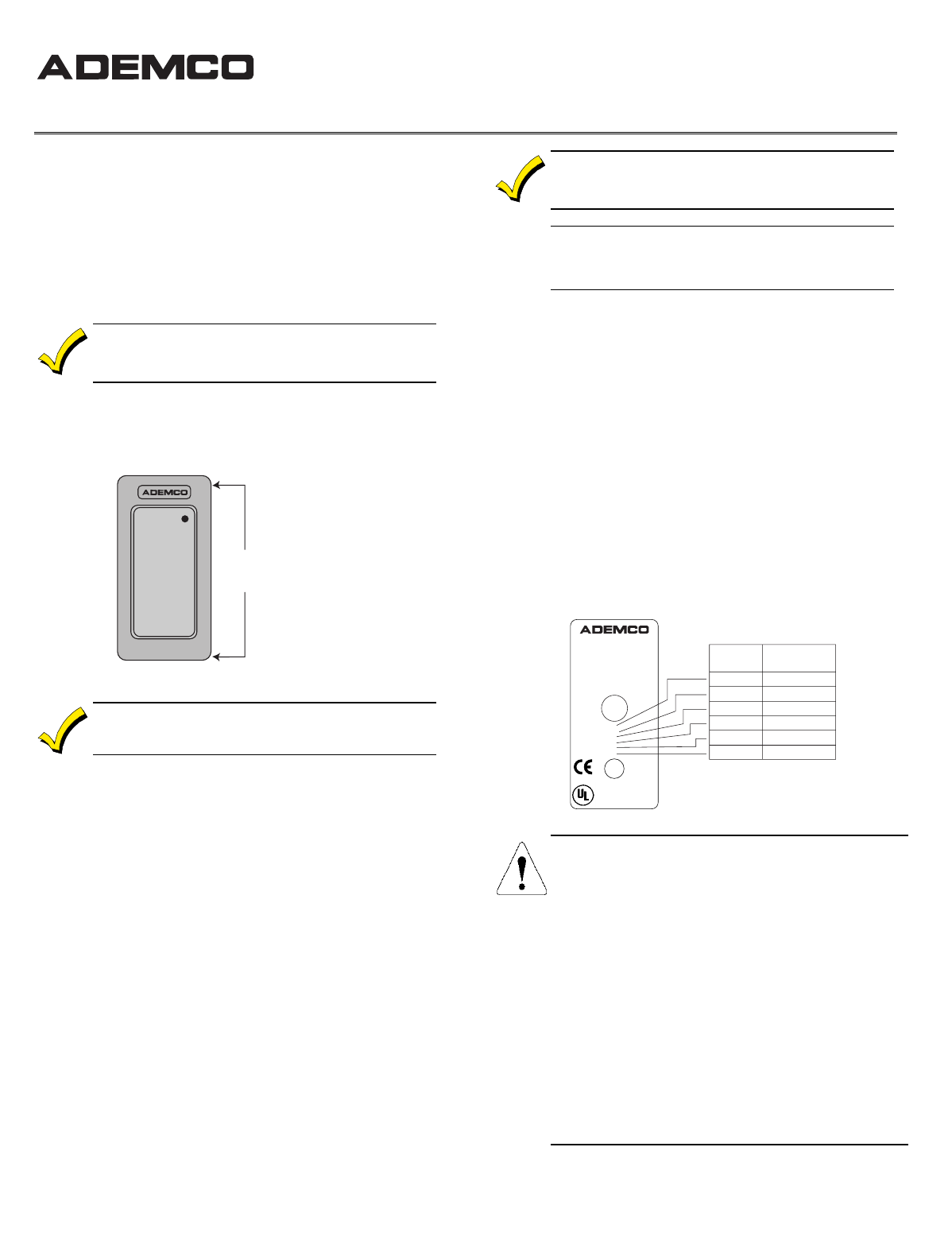Rosslare 10F301 Proximity card reader for access control systems User Manual OPMD2
Rosslare Enterprises Ltd Proximity card reader for access control systems OPMD2
Rosslare >
Contents
- 1. Instructional manual
- 2. Section 2 1033 a 3 Users manual
Section 2 1033 a 3 Users manual

K5336 4/00
-1-
®
OmniProx™ Reader
Model Series OP10/20/30/40/45
Installation Instructions
WHAT IS THE ADEMCO OmniProx™ READER?
The OmniProx Reader is an RFID proximity card
reader to be installed for use with access control
systems.
These Installation Instructions contain the
following information:
• Mounting Instructions
• Connecting the Reader to the Host
• Testing and Operation of the Reader
Visit www.omniprox.com for the latest information
and technical support.
HOW TO MOUNT THE READER
Figure 1 shows the front view of the OmniProx.
When mounting, the snap-off cover must be
removed to access the screw holes.
Figure 1
Mount the Reader with the appropriate screws (not
supplied) as indicated on the template.
To mount the Reader, perform the following:
1. Determine an appropriate mounting position
for the Reader.
2. Peel off the back of the self-stick mounting
label template included with the unit and place
at the desired mounting position. (Additional
templates can be downloaded from
www.omniprox.com.)
3. Using the template as a guide, drill two holes
(hole size is indicated on mounting template)
for mounting the Reader to the surface.
4. Drill a 7/16” (10mm) hole for the cable. If
mounting on metal, place a grommet or
electrical tape around the edge of the hole.
5. Route the interface cable from the Reader
and/or power supply to the host. A linear type
power supply is recommended.
NOTE: The OmniProx Reader can also be mounted using
strong epoxy glue. After application, the Reader should be
firmly held in place until the glue dries.
Check all electrical codes for proper installation.
ULCard Reader Models OP10/20/30/40/45 are to be
used with control panels whose power supply is UL
listed Class 2 or equivalent.
HOW TO CONNECT THE READER TO THE HOST
The OmniProx Reader is supplied with an 18-inch
pigtail, having a 6-conductor cable. To connect the
Reader to the Host, perform the following steps:
1. Prepare the Reader cable by cutting the cable
jacket back 1¼ inches and strip the wires ½ inch.
2. Prepare the Host cable by cutting the cable jacket
back 1¼ inches and strip the wires ½ inch.
3. Splice the Reader pigtail wires to the
corresponding Host wires and cover each
connection (see Figure 2).
4. If the tamper output is being utilized, connect
the purple wire to the correct input on the host.
5. Trim and cover all conductors that are not used.
Figure 2 below shows how you should wire the
Reader to the Host.
®
Proximity Reader
FCC ID:
This device complies with part 15 of the FCC
rules. Operation is subject to the folowing two
conditions: (1) This device may not cause
harmful interference. (2) This device must
accept any interference received including
interference that may cause undesired operation.
®
LISTED
ACCESS CONTROL
SYSTEM UNIT
ACCESSORY
UL 294
S/N:
COLOR WIEGAND
OUTPUT
Red DC+ Input
Black Ground
White Data 1
Green Data 0
Brown LED Control
Purple Tamper
RED - 4.75-16VDC
BLACK-SHIELD/GND
WHITE-DATA 1
GREEN-DATA0
BROWN-LEDCTL
PURPLE-TAMPER
Cable Notes:
1.
The individual wires coming out of the reader are color
coded according to the recommended Wiegand standard.
2. When using a separate power supply for the Reader, this
supply and the Host’s power supply must have a common
ground.
3. The recommended cable is Alpha 1295C which has five
conductors. If the Host is monitoring the Reader’s tamper
output, use six conductor Alpha 1296C. Larger wire
gauges are acceptable. The wire must be stranded with
an overall shield, either foil or braided.
4. The cable shield wire on the Reader should be attached
to an Earth ground (best) or signal ground connection at
the panel or power supply end of the cable. This
configuration is best for shielding the Reader cable from
external interference.
Figure 2
®
SNAP ON/OFF TOP COVER:
Remove to reveal screw holes
for mounting.

-2-
HOW TO TEST AND OPERATE THE READER
The Reader should be tested after wiring it to a
power supply and the Host. Do this by performing
the following steps:
1. Power up the Reader. The LED and Beeper
will activate three times. This indicates that
the Reader is working properly.
2. Present the appropriate type of ID card to the
Reader. (See Table 1 for the correct card type
based on the reader model.) The LED will
momentarily flash green and a short beep will
be emitted. This indicates that the card was
read properly by OmniProx.
3. After the card data is processed by the Host,
the Host can then turn the LED green or
yellow. Refer to the Host description of the
LED operation if the Reader LED is controlled
by the Host.
Table 1: Model Number vs. Feature Matrix
Model
Number ♦Card
Type Output
Format Read
Range
(Max.) *
OP10-FWcHID Wiegand 3”
OP10-AWcADEMCO Wiegand 3”
OP20-FWcHID Wiegand 4”
OP20-AWcADEMCO Wiegand 4”
OP30-FWcHID Wiegand 5”
OP30-AWcADEMCO Wiegand 5”
OP40-FWcHID Wiegand 4”
OP40-AWcADEMCO Wiegand 4”
OP45-FWcHID Wiegand 4”
OP45-AWcADEMCO Wiegand 4”
♦ Last character (c) of OmniProx Model Number
indicates color; B = Black, G = Gray, W = White,
etc.
*Measured using HID Corp. Prox Card II (P/N
1326LSSMV) or equivalent. Range also depends
on electrical environment and/or proximity to
metal.
SPECIFICATIONS
Electrical Characteristics:
Power Supply Type:
Linear type Recommended
Operating Voltage Range:
4.75 – 16 VDC
Absolute Maximum (non-operating):
18 VDC
Current @ 12V:
Standby: 25 mA
Read: 40 mA
Tamper Output
Open collector, active low, max.sink current is 30 mA
Maximum Cable Distance to Host:
500 ft. (150 meters)
Card Read Distance:
See Table 1
Regulatory Approvals:
USA: UL 294 & FCC Part15 B
Europe: CE Listed
Operating Temperature Range:
-25° F to 145° F (-31°C to 63°C)
Operating Humidity:
0 to 95% (non condensing)
Dimensions:
OP-10:
3.15” (80mm) L x 1.58” (40mm) W x 0.50” (12.8mm) D
OP-20:
4.73” (120mm) L x 1.65” (42mm) W x 0.55” (14mm) D
OP-30:
5.71” (145mm) L x 1.69” (43mm) W x 0.79” (20mm) D
OP-40:
4.33” (110mm) L x 2.96” (75mm) W x 0.59” (15mm) D
OP-45:
3.5” (89mm) L x 3.5” (89mm) W x 0.59” (15mm) D
OmniProx models with HID
compatibility are capable of
reading genuine HID cards
under the terms of a license
agreement between HID Corp.
and the ADEMCO Group.

-3-
ADEMCO Limited Warranty
Alarm Device Manufacturing Company, a Division of Pittway Corporation, and its divisions, subsidiaries and affiliates ("Seller"), 165
Eileen Way, Syosset, New York 11791, warrants OmniProx products to be in conformance with its own plans and specifications and to
be free from defects in materials and workmanship under normal use and service for the life of the product. Seller's obligation shall be
limited to repairing or replacing, at its option, free of charge for materials or labor, any product which is proved not in compliance with
Seller's specifications or proves defective in materials or workmanship under normal use and service. Seller shall have no obligation
under this Limited Warranty or otherwise if the product is altered or improperly repaired or serviced by anyone other than Ademco
factory service. For warranty service, return product transportation prepaid, to Ademco Factory Service, 165 Eileen Way, Syosset,
New York 11791.
THERE ARE NO WARRANTIES, EXPRESS OR IMPLIED, OF MERCHANTABILITY, OR FITNESS FOR A PARTICULAR
PURPOSE OR OTHERWISE, WHICH EXTEND BEYOND THE DESCRIPTION ON THE FACE HEREOF. IN NO CASE SHALL
SELLER BE LIABLE TO ANYONE FOR ANY CONSEQUENTIAL OR INCIDENTAL DAMAGES FOR BREACH OF THIS OR ANY
OTHER WARRANTY, EXPRESS OR IMPLIED, OR UPON ANY OTHER BASIS OF LIABILITY WHATSOEVER, EVEN IF THE
LOSS OR DAMAGE IS CAUSED BY THE SELLER'S OWN NEGLIGENCE OR FAULT.
Seller does not represent that the products it sells may not be compromised or circumvented; that the products will prevent any
personal injury or property loss by burglary, robbery, fire or otherwise; or that the products will in all cases provide adequate warning
or protection. Customer understands that a properly installed and maintained alarm may only reduce the risk of a burglary, robbery,
fire or other events occurring without providing an alarm, but it is not insurance or a guarantee that such will not occur or that there
will be no personal injury or property loss as a result. CONSEQUENTLY, SELLER SHALL HAVE NO LIABILITY FOR ANY
PERSONAL INJURY, PROPERTY DAMAGE OR OTHER LOSS BASED ON A CLAIM THE PRODUCT FAILED TO GIVE
WARNING. However, if Seller is held liable, whether directly or indirectly, for any loss or damage arising under this Limited
Warranty or otherwise, regardless of cause or origin, Seller's maximum liability shall not in any case exceed the purchase price of the
product, which shall be the complete and exclusive remedy against Seller. This warranty replaces any previous warranties and is the
only warranty made by Seller on this product. No increase or alteration, written or verbal, of the obligations of this Limited Warranty
is authorized.
FEDERAL COMMUNICATIONS COMMISSION (FCC) Part 15 STATEMENT
This equipment has been tested to FCC requirements and has been found acceptable for use. The FCC requires the following
statement for your information:
This equipment generates and uses radio frequency energy and if not installed and used properly, that is, in strict accordance with the
manufacturer's instructions, may cause interference to radio and television reception. It has been type tested and found to comply with
the limits for a Class B computing device in accordance with the specifications in Part 15 of FCC Rules, which are designed to provide
reasonable protection against such interference in a residential installation. However, there is no guarantee that interference will not
occur in a particular installation. If this equipment does cause interference to radio or television reception, which can be determined
by turning the equipment off and on, the user is encouraged to try to correct the interference by one or more of the following measures:
• If using an indoor antenna, have a quality outdoor antenna installed.
• Reorient the receiving antenna until interference is reduced or eliminated.
• Move the radio or television receiver away from the receiver/control.
• Move the antenna leads away from any wire runs to the receiver/control.
• Plug the receiver/control into a different outlet so that it and the radio or television receiver are on different branch circuits.
If necessary, the user should consult the dealer or an experienced radio/television technician for additional suggestions. The user or
master may find the following booklet prepared by the Federal Communications Commission helpful:
"Interference Handbook"
This booklet is available from the U.S. Government Printing Office, Washington, DC 20402.
The user shall not make any changes or modifications to the equipment unless authorized by the Installation Instructions or User's
Manual. Unauthorized changes or modifications could void the user's authority to operate the equipment.
Acknowledgements:
OmniProx is a registered trademark of Pittway Corp.
HID is a licensed trademark of HID Corp.

165 Eileen Way, Syosset, New York, 11791
Copyright 2000 PITTWAY CORPORATION
¬.l
K5336 4/00